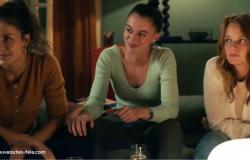It’s not a film about journalism – or even a bit, about journalism – and that’s a good thing. It’s a documentary, undoubtedly, there are no actors, it’s shot on the spot, it relates real events. It’s a comedy, we laugh a lot. But since we sometimes have tears in our eyes, should we also say that it is a tragedy? It’s a road movie, yes, the story of a trip to Afghanistan in 2002. Riverboom resists classification into one genre or another and this is one of its great qualities. It was almost by chance that Claude Baechtold accompanied the Swiss journalist Serge Michel and the Italian photographer Paolo Woods on the Afghan roads, a year after the attacks of September 11, 2001, when the Americans landed in Kabul to hunt for Osama Bin Laden and his associates. Claude is then a young typographer, grieving for his parents who died in a car accident. After having reached Kabul by car from Vevey with Serge Michel and not being able to return to Switzerland due to lack of a plane, he bought a camera at the bazaar and climbed into the back seat of the car which would drive the journalist and the photographer, as well as their interpreter. , on the perilous roads of a country where there is a Pax Americana not really peaceful. But this is not a film about war. During the screening inaugurating the release of the film in Swiss cinemas, the director, to whom a journalist asked his opinion on the political situation in Afghanistan, declared: “I do not judge the countries and the people who live there. On this trip, we didn’t save anyone in Afghanistan, it was Afghanistan that saved us.” Riverboom is a great film, with a lot of humor and self-mockery. It’s a film that doesn’t lecture, that doesn’t take itself seriously, so we take it very seriously. It shows intersecting trajectories, moving away, getting closer, arrangements, relationships to others, to oneself, to reality and to dreams. Barely out of the session, we want to see him again.





